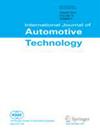基于 5 循环测试的大韩民国内燃机汽车燃油经济性新公式
IF 1.5
4区 工程技术
Q3 ENGINEERING, MECHANICAL
引用次数: 0
摘要
韩国的汽车燃油经济性评级系统自 2012 年起采用美国的 5 循环燃油经济性系统,为消费者提供全面的信息。然而,由于资源限制,推导出的 5 循环方程式被用于使用 2 循环测试来近似 5 循环测试结果。本研究对韩国 20 种最新车型的衍生 5 循环燃料经济性方程的准确性进行了检验,并根据 5 循环和 2 循环燃料消耗量之间的相关性对其进行了更新。更新后的公式有望完善多达三种车型的燃油经济性评级,从而确保标签的可靠性。本文章由计算机程序翻译,如有差异,请以英文原文为准。

A New Equation for Fuel Economy of Internal Combustion Engine Vehicles in Republic of Korea Based on 5-Cycle Test
The vehicle fuel economy rating system in South Korea has adopted the US 5-cycle fuel economy system since 2012 to provide consumers with comprehensive information. However, due to resource constraints, derived 5-cycle equations have been utilized to approximate 5-cycle test results using the 2-cycle test. This study examines the accuracy of derived 5-cycle fuel economy equations for 20 recent vehicle models in Korea and updates them based on the correlation between 5-cycle and 2-cycle fuel consumption. The updated equations are expected to refine fuel economy ratings for up to three models, ensuring the label's reliability.
求助全文
通过发布文献求助,成功后即可免费获取论文全文。
去求助
来源期刊
CiteScore
3.10
自引率
12.50%
发文量
129
审稿时长
6 months
期刊介绍:
The International Journal of Automotive Technology has as its objective the publication and dissemination of original research in all fields of AUTOMOTIVE TECHNOLOGY, SCIENCE and ENGINEERING. It fosters thus the exchange of ideas among researchers in different parts of the world and also among researchers who emphasize different aspects of the foundations and applications of the field.
Standing as it does at the cross-roads of Physics, Chemistry, Mechanics, Engineering Design and Materials Sciences, AUTOMOTIVE TECHNOLOGY is experiencing considerable growth as a result of recent technological advances. The Journal, by providing an international medium of communication, is encouraging this growth and is encompassing all aspects of the field from thermal engineering, flow analysis, structural analysis, modal analysis, control, vehicular electronics, mechatronis, electro-mechanical engineering, optimum design methods, ITS, and recycling. Interest extends from the basic science to technology applications with analytical, experimental and numerical studies.
The emphasis is placed on contributions that appear to be of permanent interest to research workers and engineers in the field. If furthering knowledge in the area of principal concern of the Journal, papers of primary interest to the innovative disciplines of AUTOMOTIVE TECHNOLOGY, SCIENCE and ENGINEERING may be published. Papers that are merely illustrations of established principles and procedures, even though possibly containing new numerical or experimental data, will generally not be published.
When outstanding advances are made in existing areas or when new areas have been developed to a definitive stage, special review articles will be considered by the editors.
No length limitations for contributions are set, but only concisely written papers are published. Brief articles are considered on the basis of technical merit.

 求助内容:
求助内容: 应助结果提醒方式:
应助结果提醒方式:


